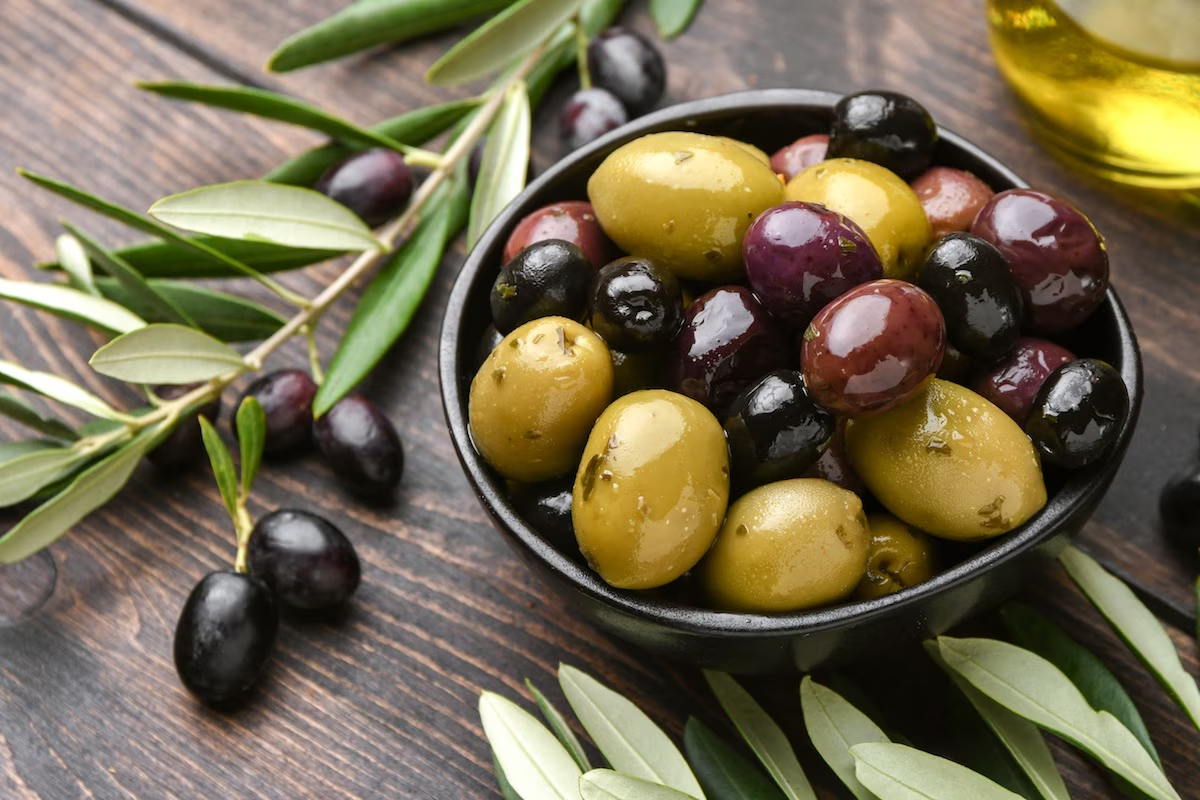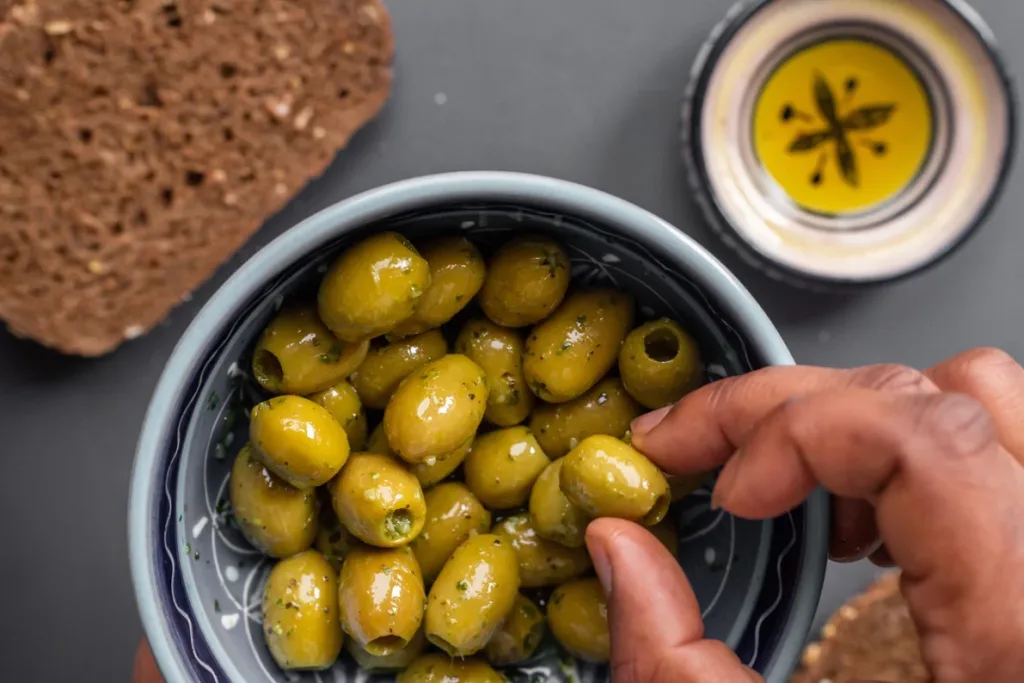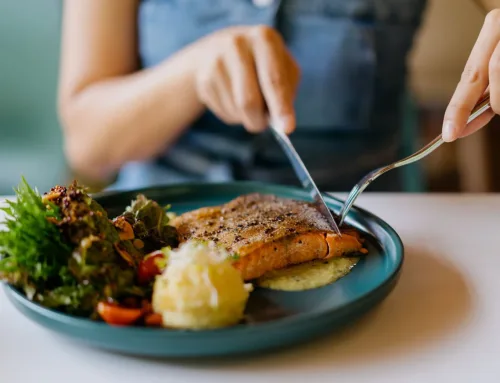What lies behind pregnancy and olive cravings? The reasons can range from the nutritional benefits that olives provide to various psychological factors at play. The science behind why these green delights become so appealing during pregnancy is indeed intriguing.
This article delves into the relationship between pregnancy and food cravings, with a particular focus on olives. It also offers insights on how to satisfy these cravings in a healthy manner while remaining aware of any potential risks.
Let us explore the reasons behind this unique phenomenon and discuss effective ways to navigate it.
The Link Between Pregnancy and Food Cravings
Pregnancy is a distinctive phase in a woman’s life marked by numerous physical and emotional changes, often leading to various cravings. Many pregnant women report experiencing intense food cravings, which can result in dietary changes reflecting their evolving nutritional needs.
Understanding the connection between pregnancy and these cravings is crucial for managing them in a healthy manner, as they may be influenced by hormonal fluctuations, mood swings, and even cultural beliefs about food preferences.
Exploring these cravings can enable individuals to make informed food choices that support both maternal health and the development of the baby.
Understanding the Science Behind Cravings
Understanding the science behind cravings during pregnancy requires examining the interplay of hormones, psychological factors, and emotional eating patterns. Hormonal fluctuations can significantly influence mood swings and appetite changes, resulting in specific cravings or food aversions that may seem puzzling. Research suggests that these cravings could be the body’s way of signaling nutritional deficiencies or a heightened need for certain essential nutrients. By exploring this science, pregnant women can gain insights into what triggers their cravings and how to manage them effectively.
The connection between cravings and nutrient absorption is quite intricate. Often, the body craves foods rich in vitamins and minerals that might be lacking in one’s current diet. Psychological factors also play a crucial role; for example, stress and past experiences with certain foods can shape these cravings. Stress may lead to emotional eating, where the urge for comfort foods becomes particularly strong.
By understanding these psychological influences, individuals can make healthier eating choices. This knowledge allows them to respond to cravings more thoughtfully, ultimately fostering better nutritional habits during this transformative period.
Why Pregnancy and Olive Cravings Are Common

Cravings for olives during pregnancy are quite common and can be linked to their impressive nutritional profile and health benefits. Olives are rich in essential nutrients, including omega-3 fatty acids, vitamins, and minerals, all of which are important for both maternal health and the development of the baby.
Many pregnant women find themselves drawn to olives, especially within the context of the Mediterranean diet, which highlights healthy fats and nutrient-rich foods. By understanding the reasons behind these cravings, women can make informed decisions about how to include olives in their pregnancy diet.
Nutritional Benefits of Olives for Pregnant Women
The nutritional benefits of olives for pregnant women are quite remarkable, making them an excellent choice for a pregnancy diet. Olives are rich in healthy fats and serve as a source of essential fatty acids, which are important for the development of the baby’s brain and nervous system. They also provide significant amounts of antioxidants, folic acid, iron, and calcium, all of which are crucial for both maternal health and fetal growth. Incorporating olives into meals can effectively help meet the increased nutritional needs during pregnancy.
These vitamins and minerals play vital roles in supporting a healthy pregnancy. For example, folic acid is critical for preventing neural tube defects, making it an essential nutrient during the early stages of fetal development. Iron helps accommodate the increased blood volume and oxygen transport, ensuring that both mother and baby receive adequate nourishment. Meanwhile, calcium is necessary for the development of the baby’s bones and teeth.
By including olives in their diet, expectant mothers can not only enhance the flavor of their meals but also benefit from a nutrient-dense option that supports a balanced pregnancy diet.
Further reading: Why Pregnant Women Crave Eggs: Nutrition and Health Insights
Psychological Factors and Cravings
Psychological factors significantly influence cravings during pregnancy, shaping not only what pregnant women desire but also how they react to these cravings. Emotional eating, often triggered by mood swings and sensory changes, can lead to a stronger inclination toward specific foods, such as olives. Gaining an understanding of these psychological elements can offer valuable insights into effectively managing cravings and ensuring that food choices meet nutritional needs.
For example, when stress levels increase, a pregnant woman may find herself reaching for comfort foods that bring back positive memories or sensations, like the salty crunch of potato chips or the sweetness of chocolate. These cravings can be intensified by hormonal fluctuations and physical discomfort, creating a cycle that reinforces unhealthy eating habits.
The relationship between emotional states and food preferences is quite complex, revealing that food choices may be driven more by emotional needs than by actual hunger. By recognizing these triggers, healthier alternatives can be incorporated, supporting both emotional and physical well-being during this important period.
Coping with Olive Cravings During Pregnancy

Coping with olive cravings during pregnancy requires finding healthy ways to satisfy these urges while also meeting nutritional needs.
Pregnant women might consider various culinary uses for olives, such as adding them to salads, spreads, and dips, or using olive oil for cooking and dressing dishes.
Pairing olives with other nutrient-rich foods can help create balanced meals that not only address cravings but also support overall well-being.
By understanding how to manage these cravings effectively, pregnant women can feel enabled to make healthier food choices.
Healthy Ways to Satisfy Cravings
Satisfying cravings in a healthy manner is essential during pregnancy, and olives serve as a versatile ingredient in many recipes. By incorporating olives into meals, pregnant women can enjoy the benefits of healthy fats and essential nutrients while savoring flavorful dishes. Thoughtful meal planning that includes olives can effectively manage cravings, allowing for culinary creativity without compromising nutritional value. Exploring various recipes can provide satisfying options that align with both cravings and dietary preferences.
From adding olives to salads for a zesty kick to blending them into a rich tapenade for sandwiches or appetizers, olives can truly enhance any meal. They are also ideal for Mediterranean-inspired dishes, such as pasta salads, where their briny flavor pairs beautifully with fresh vegetables and whole grains.
For a simple yet nutritious snack, one might consider combining olives with nuts and cheese, creating a delightful balance of healthy fats and protein. Whether it’s a classic olive tapenade, a hearty olive-studded focaccia, or a flavorful pizza topping, there are numerous options for pregnant women to explore, all while supporting their health and indulging their taste buds.
Purchasing Guidelines for Olives
When purchasing olives during pregnancy, choose fresh counter options and marinated organic olives to ensure quality and safety. Fresh counter olives are less processed and often preserved in natural brine, which can help reduce unnecessary additives. Opt for organic, marinated varieties that are free from artificial preservatives, ensuring the olives are sourced responsibly and packed with beneficial nutrients like healthy fats, vitamins, and antioxidants. Always check labels for sodium content, as too much salt can contribute to swelling and high blood pressure during pregnancy.
Storage Tips for Olives
To maintain the freshness of opened olive jars and partially consumed packages, transfer any remaining olives into an airtight, tightly sealed container to prevent bacteria formation. Always store olives in the refrigerator once opened, as this slows spoilage and preserves their flavor. Ensure the container is properly sealed to avoid exposure to air, which can lead to contamination. Regularly check for any signs of spoilage, such as changes in color or odor, to ensure the olives remain safe for consumption.
Potential Risks of Overindulging in Olives During Pregnancy

While olives provide a variety of health benefits, it’s crucial to consider the potential risks of overindulgence during pregnancy. Some olive varieties have a high sodium content, which can lead to increased blood pressure, posing health concerns for pregnant women.
Additionally, consuming olives in excess can affect weight management and may disrupt blood sugar levels. Being aware of these risks is important for maintaining a balanced diet that supports the health of both the mother and the developing baby.
Effects on Weight and Blood Sugar Levels
The effects of olive consumption on weight and blood sugar levels can vary depending on portion sizes and overall dietary habits during pregnancy. While olives offer healthy fats that can be beneficial, consuming them in excess may lead to unintended weight gain and fluctuations in blood sugar levels, especially when combined with sodium-rich foods. By adhering to health guidelines and practicing moderation, pregnant women can enjoy olives without compromising their well-being.
Opting for low-sodium varieties and balancing olive intake with a wide range of nutrient-dense foods can positively impact a pregnant woman’s overall health. It’s essential to understand that while olives are rich in monounsaturated fats and antioxidants, their role in a balanced diet should be thoughtfully considered.
By being mindful of portion sizes and sodium content, one can enjoy the benefits of olives, such as supporting heart health and maintaining stable blood sugar levels, ultimately aiding in effective weight management during this important time.
Further reading: Why You Crave Meat During Pregnancy: What to Know
Balancing Cravings with Nutritional Needs
Balancing cravings with nutritional needs is essential during a healthy pregnancy, particularly when it comes to managing cravings for olives. It is important for pregnant women to aim for a balanced diet that encompasses a wide variety of foods, ensuring they obtain essential nutrients while also addressing specific cravings.
By understanding how appetite regulation works and incorporating nutrient-dense foods, they can effectively manage cravings while supporting overall maternal health.
Incorporating an abundance of fruits, vegetables, whole grains, and protein sources can satisfy the palate without sacrificing nutritional goals. Staying adequately hydrated is also crucial, as many cravings can arise from dehydration.
Additionally, pregnant women might find it helpful to portion their snacks, allowing them to indulge in their cravings without the risk of overeating. Focusing on magnesium-rich foods, such as nuts and leafy greens, can also help alleviate feelings of hunger and promote mood stability.
Ultimately, this balanced approach not only helps to meet cravings but also ensures that both mother and baby thrive during this transformative period.
Frequently Asked Questions
What causes pregnancy cravings for olives?
The exact cause of pregnancy cravings for olives is unknown, but it is believed to be related to hormonal changes and the body's increased need for certain nutrients during pregnancy.
Are olives safe to eat during pregnancy?
Yes, olives are generally safe to eat during pregnancy as long as they are consumed in moderation. However, it is always best to consult with your doctor before adding any new food to your diet during pregnancy.
Can olives provide any nutritional benefits during pregnancy?
Yes, olives are a good source of healthy fats, vitamin E, and iron, which are important nutrients for both the mother and baby during pregnancy. They can also help with digestion and provide antioxidants.
Is it normal to crave olives during pregnancy?
Yes, it is completely normal to experience food cravings during pregnancy, including cravings for olives. However, if you have intense or uncontrollable cravings, it is best to speak with your doctor.
Are there any risks associated with eating olives during pregnancy?
In general, olives are safe to consume during pregnancy. However, if you have a history of food allergies or sensitivities, it is best to avoid them or consult with your doctor before consuming them.




